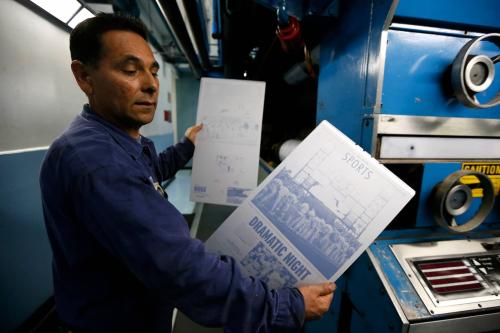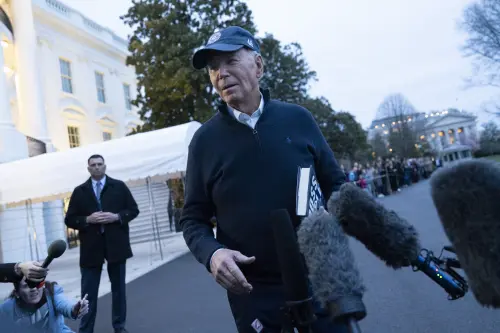On March 31, Brookings hosted the Turkish President Recep Tayyip Erdoğan, who delivered a speech on “Global Challenges and Turkey’s Goals for the Year 2023.” His speech focused mainly on terrorism and the need for international cooperation in combating it (while also jabbing at Washington’s support for some Kurdish groups in Syria that Turkey defines as terrorist organizations). He also spoke about economic inequality and the challenges associated with the Syrian civil war, among other themes. Not surprisingly, Erdoğan took care to elaborate on the economic gains and democratic and legal reforms implemented during his 13 years in power. The talk—which lasted 40 minutes, twice the time foreign dignitaries speaking at Brookings typically take—left many wondering at the gap between the event’s title and its actual content.
Free speech in jeopardy
The elephant in the room—the issue of freedom of expression—came up during a moderated discussion with Brookings Executive Vice President Martin Indyk after the president’s prepared remarks. Freedom House lists Turkey as “not free” on freedom of the press and as only “partly free” overall. There has been a particularly sharp deterioration in recent years—many journalists have lost their jobs (with some detained) and newspapers have been taken over. Erdoğan quickly deflected Indyk’s question, sticking to his usual talking points: that those behind bars are not journalists but terrorists, as he repeated during an interview with Christiane Amanpour on CNN International later that evening. He confidently described the level of media freedom in Turkey as one of the best in the world. In response to a question about his personal tolerance for criticism, he distinguished between constructive criticism and insults (emphasizing his view that he and his family have been victims of the latter).
Hypersensitivity to criticism was, meanwhile, on full display outside Brookings that day. Erdoğan’s security detail behaved unacceptably—they roughed up protesters outside the building and tried to drag away “undesired” journalists, an approach typical of the Russians or Chinese. Brookings extended its hospitality to Erdoğan, and because he was an invited guest went to considerable lengths to accommodate his massive entourage and treat him with respect. But his security detail abused Brookings’s hospitality. They picked fist fights with demonstrators and attempted to evict Turkish journalists. Brookings staff, including the President Strobe Talbott, had to escort the journalists back into the building. At one point, according to one eye-witness, Talbott had to threaten to cancel the event if they did not desist with their thuggish behavior. Unfortunately, Erdoğan’s visit to Brookings and the capital of the world’s leading democracy will be remembered more for these incidents than for the talk itself. It was a sad day indeed that in an institution with a longstanding tradition of receiving leaders from all corners of the world, the talk by the president of Turkey—a NATO ally—was the one to cause such commotion. Veteran Brookings employees could not remember a similar experience at any point in the last decade.
The president and his security detail clearly failed to recognize the protests for what they were: a natural and accepted activity in a democracy rather than an imagined conspiracy against Turkey. Moreover, they apparently failed to recognize that they were not on their home turf—ironically, it is a core principle in Turkish culture one shows utmost respect for his host.
Deteriorating landscape
This was not Erdoğan’s first visit to Brookings—but when he came in May 2013, there were no protests and no heavy-handed responses at odds with democratic values. What has changed?
For one, the world has become a more complex and insecure place, especially in Turkey’s neighborhood (this is something the president highlighted in his speech). When Erdoğan last visited Brookings, the Arab Spring was still on a positive trajectory and there was real hope that a new era of democratic transformation and economic reform was dawning in the Middle East. Turkey was seen as a model at the time: It had succeeded in reconciling Islam with democracy and developed a liberalized market economy. Then-Prime Minister Erdoğan played a very personal role in shaping Turkey’s image, and during a public speech in Cairo in February 2011 called on the Muslim Brotherhood (then in power in Egypt) to follow his example, as a practicing Muslim leading an otherwise secular state. This was also a time when Rashid Ghannouchi in Tunisia would often cite Turkey as a model he aspired to emulate. At the time, there was still hope that the unrest in Syria could be brought to a speedy end.
Today, the Middle East is a very different place, with war and a humanitarian crisis displacing millions of Syrians and Iraqis. The situation has turned Turkey into a refuge for victims of conflict, but also an incubator for terrorism as the country gets drawn into the chaos emanating from Syria. This has fed a politics of fear—not just in Turkey, but across Europe and in the United States. The protests and scuffles at Brookings last week, as well as Erdoğan’s remarks, should be evaluated against this background.
Another big change since Erdoğan’s last visit to Brookings is that Turkish democracy has deteriorated precipitously. While there have long been red flags, Turkish democratic credentials all but evaporated after the violent repression of the Gezi Park protests in Istanbul in 2013. By taking such a heavy-handed approach, commented a prominent European minister and a close friend of Erdoğan’s, Erdoğan “managed to snatch defeat out of the jaws of victory.” During his speech last week, Erdoğan made no reference to democratic institutions—such as the Turkish parliament, free and fair parliamentary elections, or the courts—nor did he mention the 48 percent of people who did not vote for him in the August 2014 presidential election. Just a few years ago, Turkey was hailed as an emerging liberal democracy; now, that label is in serious doubt.
Lastly, there is the Kurdish issue. There had been progress in recent years: Turkey implemented a series of EU-oriented reforms that recognized Kurdish ethnic identity and acknowledged Kurdish cultural rights. And in 2015, for the first time, a Kurdish political party was able to make it over Turkey’s notoriously high electoral threshold and won representation in the Turkish parliament. Notably, a peace process was launched—that aimed to reach a political modus vivendi with the Kurds, including the granting them a form of autonomy. As late as November 2014, Erdoğan’s former interior minister and deputy prime minister even criticized those who still thought the Kurdish “problem” could only be resolved with arms, instead advocating a political solution.
Today, however, the Kurdish issue is intertwined with the fight against terrorism and the Kurdistan Workers’ Party (PKK). The Turkish government has adopted an increasingly loose and wide-ranging definition of terrorism. Partly as a result, Kurdish-populated towns in Turkey’s southeast resemble Syria’s destroyed cities, with large numbers of Kurds displaced or killed. Meanwhile, there are efforts to walk back gains in parliament, with proposed bans on Kurdish members of the body on the grounds that they have aided and abetted terrorism. All of this is only polarizing the country further, stoking up nationalist sentiments on both sides. At Brookings last week, it is perhaps not surprising that the loudest and most numerous protesters were Kurds—the president’s security detail, for its part, disregarded basic civility when they roughed up a prominent journalist and called her “a PKK whore.”
Credit and criticism where each is due
Needless to say, Turkey has changed a lot in the last few years. Yes, Erdoğan deserves credit for the economic, political, and social achievements he has helped lead. He was also correct in expressing his concern about the many challenges Turkey faces today. Some of his criticisms of the international community—especially with regards to the Syrian conflict and the associated humanitarian crisis, as well as about combating terrorism—are on-point.
However, bullying of the kind that happened at Brookings last week does not exactly align with the spirit of cooperation that the president called for. Unfortunately, Turkey’s many legitimate concerns were lost in the noise of the needless scuffles.
The reality is very complex: Turkey’s neighborhood, not to mention Europe, is going through particularly taxing times. It would be simplistic to assume that Erdoğan—or any other national leader—is always right or always wrong (and simplistic, too, for Erdoğan to assume that of others). A Turkish saying, çuvaldızı kendine batırmak—which advises that you think twice before doing something that could potentially hurt someone—highlights the virtues of being self-critical and self-reflective. A bit of modesty would help Erdoğan tackle the challenges facing Turkey and hopefully help him find a way out of Turkey’s fast-deepening governance malaise.



Commentary
Turkey’s downward spiral and the scuffles at Erdoğan’s Brookings speech
April 4, 2016